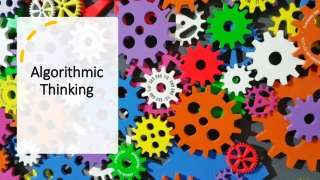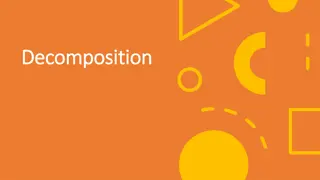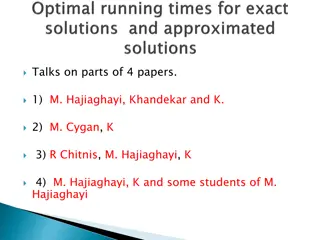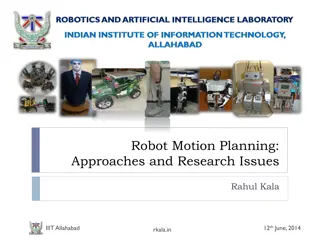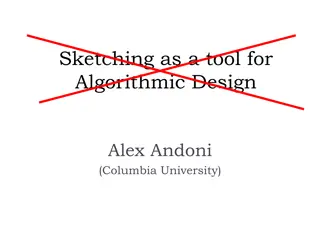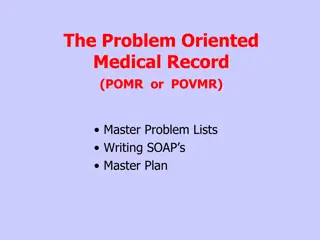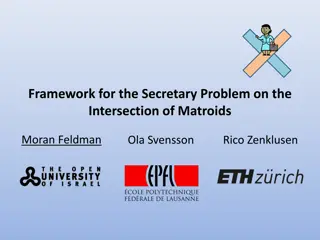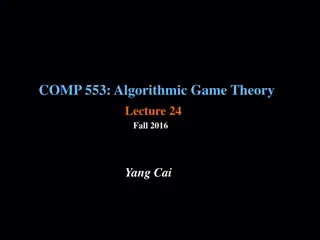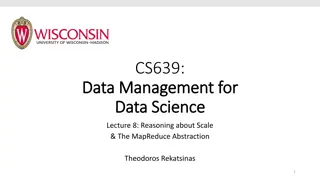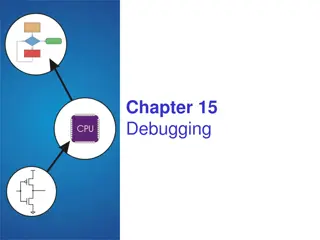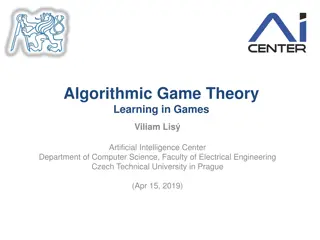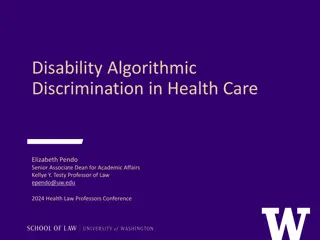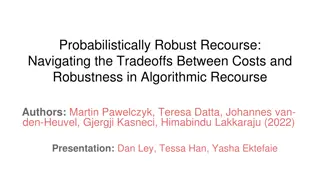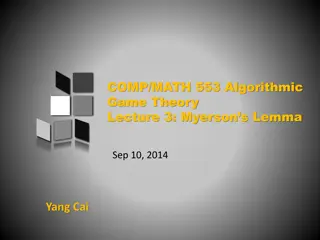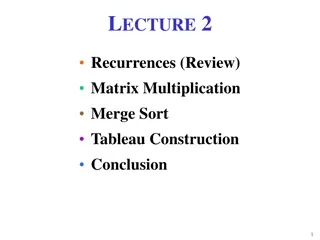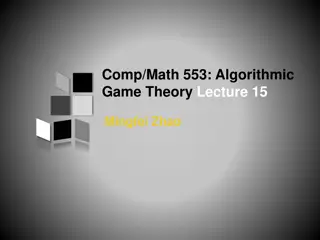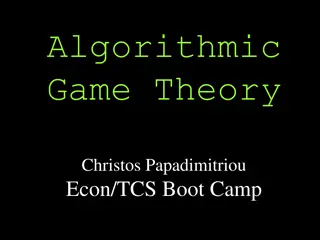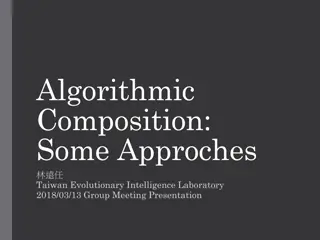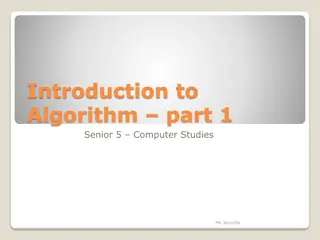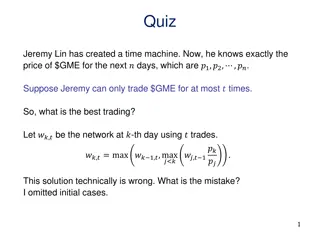Understanding Algorithmic Thinking: Key Concepts and Importance
Algorithmic thinking is a crucial skill that involves problem-solving through precisely defined instructions. This competency, applicable beyond computing, entails analyzing problems, identifying steps to solve them, and designing efficient algorithms. The importance of algorithmic thinking lies in
1 views • 13 slides
Understanding the Power of Decomposition in Problem Solving
Learn about the concept of decomposition and its importance in problem-solving scenarios in both real-life and Computer Science. Discover how breaking down complex problems into manageable sub-problems can lead to efficient solutions. Explore how decomposition aligns with algorithmic thinking and en
1 views • 11 slides
HotFuzz: Discovering Algorithmic Denial-of-Service Vulnerabilities
A detailed exploration of algorithmic complexity bugs and insight into distributed micro-fuzzing methods. The study uncovers vulnerabilities through guided micro-fuzzing approaches, emphasizing the importance of AC bug detection and fuzz testing techniques such as seed inputs, fuzz observations, and
0 views • 14 slides
Overview of Research Problem Identification and Formulation
Understanding the importance of defining a research problem, this content delves into the selection and formulation of research problems, the definition of a research problem, reasons for defining it, methods for identifying research problems, sources of research problems, and considerations in sele
1 views • 11 slides
Understanding the Right to an Explanation in GDPR and AI Decision Making
The paper delves into the necessity for Explainable AI driven by regulations such as the GDPR, which mandates explanations for algorithmic decisions. It discusses the debate surrounding the existence of a legally binding right to explanation and the complexities of accommodating algorithmic machines
0 views • 22 slides
Evolution of Algorithms and Computer Science Through History
The history of algorithms and algorithmic thinking dates back to ancient times, with the development of general-purpose computational machines by Charles Babbage in the 19th century marking a significant advancement. The term "computer science" emerged in 1959, encompassing theoretical computer scie
1 views • 39 slides
Computational Thinking, Algorithms & Programming Overview
This unit covers key concepts in computational thinking, including decomposition, abstraction, and algorithmic thinking. Decomposition involves breaking down complex problems, abstraction focuses on identifying essential elements, and algorithmic thinking is about defining clear instructions to solv
1 views • 5 slides
Understanding Algorithmic Thinking in Digital Systems
Explore the application of algorithmic thinking in digital systems through the journey of Mike Clapper, the Executive Director of AMT. Learn about recognizing patterns in data, creating algorithms to solve problems, and utilizing information systems creatively. Enhance your knowledge of digital syst
0 views • 56 slides
Insights into Advanced Algorithmic Problems
Delve into discussions surrounding complex algorithmic challenges, such as the limitations in solving the 3-SAT problem within specific time bounds, the Exponential Time Hypothesis, proving lower bounds for algorithms in various scenarios, and exploring approximation ratios in algorithm design. Thes
1 views • 65 slides
Divide and Conquer Algorithm Explained
Divide and Conquer algorithm involves dividing a problem into smaller sub-problems, solving them, and combining the solutions to solve the original problem efficiently. The concept is explained through examples of finding maximum and minimum elements in a set, and a detailed algorithmic approach is
1 views • 22 slides
Robotic Motion Planning: Approaches and Research Issues
This content delves into various aspects of robot motion planning, covering topics such as problem-solving in mobile robotics, strategic planning, obstacle avoidance, control, base algorithms like graph search, pros and cons of different approaches, research issues, and objectives related to travel.
0 views • 26 slides
Insights into Recent Progress on Sampling Problems in Convex Optimization
Recent research highlights advancements in solving sampling problems in convex optimization, exemplified by works by Yin Tat Lee and Santosh Vempala. The complexity of convex problems, such as the Minimum Cost Flow Problem and Submodular Minimization, are being unraveled through innovative formulas
1 views • 47 slides
Sketching as a Tool for Algorithmic Design by Alex Andoni - Overview
Utilizing sketching in algorithmic design, Alex Andoni from Columbia University explores methodologies such as succinct efficient algorithms, dimension reduction, sampling, metric embeddings, and more. The approach involves numerical linear algebra, similarity search, and geometric min-cost matching
0 views • 18 slides
Advanced Seminar on Problem Solving Techniques
Explore various problem-solving techniques such as prefix sum, hash, GCD, LCM, and more in this advanced seminar. Learn how to calculate complex mathematical functions efficiently and sort arrays in linear time complexity. Enhance your problem-solving skills and algorithmic thinking.
1 views • 23 slides
Comprehensive Guide to Problem Oriented Medical Record (POMR) and Master Problem Lists
Delve into the world of Problem Oriented Medical Records (POMR) and Master Problem Lists (MPL) through the insightful teachings of Dr. Lawrence Weed. Learn the systematic approach, SOAP writing, and the significance of maintaining a patient-focused perspective. Understand the challenges in diagnosis
0 views • 35 slides
Algorithmic Issues in Tracking: A Deep Dive into Mean Shift, EM, and Line Fitting
Delve into algorithmic challenges in tracking tasks, exploring techniques like mean shift, Expectation-Maximization (EM), and line fitting. Understand the complexities of differentiating outliers and inliers, with a focus on segregating points into best-fit line segments.
0 views • 44 slides
Understanding Greedy Algorithms in Algorithmic Design
Greedy algorithms in algorithmic design involve making the best choice at each step to tackle large, complex problems by breaking them into smaller sub-problems. While they provide efficient solutions for some problems, they may not always work, especially in scenarios like navigating one-way street
1 views • 9 slides
Matroid Secretary Problem: Intersection of Matroids & Variants
Variants of the Secretary Problem with matroid constraints have been explored, allowing for hiring multiple secretaries based on certain constraints to maximize total value. The Matroid Secretary Problem, a crucial variant, presents challenges and opportunities for algorithmic solutions in various a
0 views • 16 slides
Enhancing Algorithmic Team Formation Through Stakeholder Engagement
Integrating stakeholder voices is crucial in algorithmic team formation to ensure a positive team experience, quality outcomes, and high performance. This research explores learner-centered approaches and considers various team formation methods, highlighting their strengths and weaknesses in educat
0 views • 37 slides
Understanding Brouwer's Fixed Point Theorem and Nash's Proof in Algorithmic Game Theory
Explore the foundational theorems of Brouwer and Nash in Algorithmic Game Theory. Dive into Brouwer's Fixed Point Theorem, showcasing the existence of fixed points in continuous functions. Delve into Nash's Proof, unveiling the Nash equilibrium in game theory. Discover visualizations and constructio
0 views • 23 slides
Understanding Scalability and Algorithmic Complexity in Data Management for Data Science
This lecture delves into the concept of scalability in data management for data science, covering operational and algorithmic aspects. It discusses the importance of efficient resource utilization, scaling out to multiple computing nodes, and managing algorithmic complexity for optimal performance i
0 views • 47 slides
Proposal for Directive to Enhance Working Conditions in Platform Work
The proposal aims to address challenges in platform work, including employment status classification and algorithmic management issues. It seeks to improve transparency, fairness, and accountability in algorithmic decision-making, correctly determine employment status, enhance transparency in platfo
0 views • 13 slides
Insights into Polynomials Vanishing on Cartesian Products and the 3POL Problem
This joint work explores polynomials vanishing on Cartesian products, focusing on the 3POL problem involving three sets of points and a 6-variate polynomial. It discusses the running time of solving the explicit 3POL problem and compares it to the well-studied 3SUM problem in theoretical computer sc
0 views • 29 slides
Solving N-Queens and Missionaries & Cannibals Problems Using Search Algorithms
Explore the application of search algorithms in solving classic problems like the N-Queens problem and the Missionaries & Cannibals dilemma. Understand the concept of states, start states, goals, transitions, and goal states in these puzzles. Dive into the strategies of adding states to a to-visit l
0 views • 8 slides
Understanding Debugging in High-Level Languages
Debugging in high-level languages involves examining and setting values in memory, executing portions of the program, and stopping execution as needed. Different types of errors – syntactic, semantic, and algorithmic – require specific debugging approaches. Syntactic errors are related to code l
0 views • 9 slides
Algorithmic Game Theory Learning in Games by Viliam Lis
The content discusses the concept of algorithmic game theory learning in games, covering topics such as online learning, prediction, best response dynamics, and convergence to Nash equilibrium. It explores how simple learning agents achieve equilibrium outcomes and the application of algorithms in v
0 views • 23 slides
Algorithmic Discrimination in Health Care: Protecting Vulnerable Patients
Elizabeth Pendo and Jennifer D. Oliva discuss disability discrimination in health care algorithms, advocating for legal protections under Section 504, ADA, and ACA. Their article proposes strategies to combat algorithmic bias and enhance antidiscrimination efforts in the 2024 Section 1557 final rule
0 views • 13 slides
Understanding Greedy Algorithms in Interval Scheduling
Interval Scheduling is a classic algorithmic problem where the goal is to schedule a set of tasks to maximize efficiency without overlap. Greedy algorithms play a crucial role in solving this problem by making locally optimal choices at each step. The concept of greediness, building the solution ste
0 views • 24 slides
Enhancing Problem-Solving Skills in Mathematics Workshops
In this workshop focused on problem-solving in mathematics, participants engage in various tasks and activities to develop a deep understanding of problem-solving strategies. The key messages emphasize the importance of integrating problem-solving into daily mathematics learning, utilizing multiple
0 views • 34 slides
Efficient Multisource Broadcast in Wireless Networks
This paper delves into the challenges of propagating information efficiently in wireless networks with varying message sources. It introduces concepts like unit disk graphs, competitive ratio, and minimum-latency multi-source broadcast to address the problem. The solution involves a multi-phase appr
0 views • 39 slides
Navigating Tradeoffs in Algorithmic Recourse: A Probabilistic Approach
This paper introduces PROBE, a Probabilistically Robust Recourse framework allowing users to balance cost and robustness in algorithmic recourse. Users can choose the recourse invalidation rate, enabling more tailored and efficient recourse management compared to existing methods. PROBE enhances cos
0 views • 17 slides
Understanding Myerson's Lemma in Algorithmic Game Theory
Myerson's Lemma is a fundamental concept in algorithmic game theory, particularly in the context of Sponsored Search Auctions. This lecture delves into the application of Myerson's Lemma to ensure truthful bidding as a dominant strategy, maximize social welfare, and maintain polynomial running time
0 views • 19 slides
Understanding Algorithmic Complexity Measures and the Master Method
In this study, we explore key concepts in algorithmic complexity, including recurrences, matrix multiplication, merge sort, and tableau construction. We delve into the Master Method for solving recurrences, examining Cases 1, 2, and 3, and providing solutions for each scenario. Additionally, we disc
0 views • 61 slides
Algorithmic Game Theory Lecture on Prophet Inequality and Auction Design
In this lecture on Algorithmic Game Theory, Mingfei Zhao discusses the Prophet Inequality and its application to single-item auctions. The lecture covers the concept of Prophet Inequality, strategies to guarantee expected payoffs, and different auction designs such as the Bulow-Klemperer Theorem and
0 views • 10 slides
Exploring Levels of Analysis in Reinforcement Learning and Decision-Making
This content delves into various levels of analysis related to computational and algorithmic problem-solving in the context of Reinforcement Learning (RL) in the brain. It discusses how RL preferences for actions leading to favorable outcomes are resolved using Markov Decision Processes (MDPs) and m
0 views • 18 slides
Evolution of Algorithmic Game Theory in Computer Science
The evolution of Algorithmic Game Theory (AGT) in the realm of Computer Science showcases the intersection of economics and theoretical computation. Before 1995, notable researchers like von Neumann and Megiddo laid the foundation for AGT. Concepts such as computation as a game, bounded rationality,
0 views • 62 slides
Exploring Algorithmic Composition Techniques in Music Generation
Algorithmic composition involves the use of algorithms to create music, mimicking human composers by generating music based on specific rules and structures. This presentation delves into various approaches such as DeepBach, MuseGAN, and EMI, highlighting the use of evolutionary algorithms, machine
0 views • 35 slides
Understanding Algorithms: A Primer for Computer Studies
Delve into the world of algorithms with Ms. Jennifer as your guide in this educational series. Learn the nuances of processes, pseudo-code, and problem-solving steps through structured lessons. Grasp the essence of expressions, flowcharts, and the language of algorithms, ensuring a solid foundation
0 views • 27 slides
Mastering Big Theta Notation in Computer Science
Delve into the intricacies of Big Theta notation through challenging code examples and logical puzzles. Explore concepts of algorithmic complexity, loop analysis, and closed-form expressions to enhance your problem-solving skills in computer science.
0 views • 37 slides
Dynamic Programming in Various Algorithms
Jeremy Lin has invented a time machine that predicts $GME stock prices for upcoming days. The challenge is to determine the best trading strategy given the price predictions and constraints on the number of trades allowed. Alongside, there are announcements related to academic activities like homewo
0 views • 36 slides
